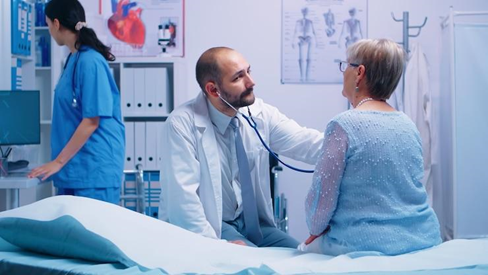The Cutting-Edge Techniques Cardiac Specialists Use For Cardiac Care

Regarding cardiac care, staying at the forefront of medical advancements is essential, and cardiac specialists continuously explore innovative techniques to deliver the highest standard of care. From cutting-edge diagnostics to advanced surgical interventions, these professionals are transforming the field of cardiac medicine. This article provides an in-depth look at the groundbreaking approaches employed by today’s cardiac specialists, including minimally invasive procedures like robotic-assisted surgery and the integration of advanced imaging technologies. It also highlights the importance of personalized treatment plans tailored to each patient’s needs. With a professional and informative tone, this article aims to educate readers about the revolutionary advancements in cardiac care while seamlessly incorporating key terms to enhance search engine optimization. Explore how these innovations improve patient outcomes and redefine cardiac care’s future.
The Importance Of Cardiac Care
Cardiac care is essential for preventing, diagnosing, and treating heart-related conditions, as cardiovascular diseases remain a leading cause of death. It focuses on prevention, education, and ongoing heart health management to reduce complications. Regular screenings enable early detection and timely interventions. Cardiac specialists, including cardiologists, surgeons, and electrophysiologists, provide advanced care with personalized treatment plans, incorporating lifestyle changes and preventive strategies. Collaborating with other healthcare professionals enhances patient outcomes and quality of life. With ongoing diagnostics, surgery, and treatment advancements, cardiac care is evolving to offer more precise, effective, and less invasive interventions, ensuring better long-term heart health.
Common Cardiac Conditions And Treatment Options
Common cardiac conditions, such as coronary artery disease, heart failure, arrhythmias, and valvular heart disease, require tailored treatments. Coronary artery disease is managed with lifestyle changes, medications, and procedures like angioplasty or bypass surgery. Heart failure is treated with medications, lifestyle adjustments, and devices like ICDs or VADs. Ongoing cardiac care advancements continue to improve patient outcomes and quality of life.
The Role Of Cardiac Specialists In Providing Advanced Care
Cardiac specialists, including cardiologists and surgeons, play a key role in diagnosing and managing heart diseases with personalized treatment plans. Their expertise and collaboration with dietitians, exercise physiologists, and rehabilitation specialists ensure comprehensive care. Incorporating advanced technology like remote monitoring and telemedicine enables real-time tracking and proactive management, improving patient outcomes.
Cutting-edge Diagnostic Techniques In Cardiac Care
Advancements in diagnostic techniques have transformed how cardiac specialists evaluate and manage heart conditions. Enhanced technologies, like cardiac MRI and advanced cardiac CT, according to Tellica Imaging, provide highly detailed images of the heart’s structure and function, enabling earlier and more accurate detection of issues. Cardiac MRI is invaluable for diagnosing conditions such as cardiomyopathy and assessing myocardial perfusion, offering insights that guide treatment. Similarly, cardiac CT angiography delivers detailed views of coronary arteries, allowing non-invasive identification of blockages and abnormalities. These innovations improve diagnostic precision, enabling timely and effective interventions that significantly enhance patient care.
Innovative Surgical Procedures For Cardiac Conditions
The future of cardiac care is bright, with advancements in technology, diagnostics, and treatment improving outcomes. Personalized care through genetic profiling and biomarker testing is rising, while minimally invasive techniques, like robotic-assisted surgery, enhance recovery. Innovations in small-incision surgery and advanced imaging allow for faster recovery. Integrative approaches combining medical care with lifestyle changes will improve adherence and well-being. Telemedicine and remote monitoring will make cardiac care more accessible, empowering patients to manage their health.
Integrative Approaches To Cardiac Care
The future of cardiac care is promising, with advancements in technology and treatment improving patient outcomes. Personalized care through genetic profiling and biomarker testing will grow, while minimally invasive techniques, like robotic-assisted surgery, will enhance recovery. Integrative approaches combining medical treatment with lifestyle changes will improve overall well-being. Collaboration among specialists will ensure tailored care and telemedicine innovations will make cardiac care more accessible, empowering patients to manage their health.
The Use Of Technology In Monitoring And Managing Cardiac Health
Cardiology care is essential for preventing, diagnosing, and treating heart-related conditions, as cardiovascular diseases are a leading cause of death globally. It emphasizes prevention, education, and ongoing heart health management, empowering individuals to make informed choices and reduce risks. Regular screenings enable early detection and timely interventions, saving lives. Cardiac specialists, including cardiologists, surgeons, and electrophysiologists, play a key role by providing personalized treatment plans and collaborating with dietitians and rehabilitation specialists. Conditions like coronary artery disease and heart failure require tailored approaches, with advances in care improving outcomes. Preventive cardiology care and cardiac rehabilitation, including exercise, education, and emotional support, are crucial for recovery and long-term heart health. It supports lifestyle changes such as a nutritious diet, regular exercise, and smoking cessation while addressing psychological well-being to enhance adherence to healthier habits. The ongoing advancements in cardiac care continue to provide better treatment options, helping improve patient quality of life and reduce the burden of cardiovascular diseases.
Cardiac Rehabilitation And Lifestyle Modifications For Better Heart Health
Cardiac care is vital for preventing, diagnosing, and treating heart conditions. It focuses on prevention, education, and management to reduce risks. Regular screenings enable early detection and timely interventions. Specialists provide personalized care, collaborating with dietitians and rehab specialists. Cardiac rehabilitation promotes long-term health through exercise, education, and lifestyle changes, improving adherence to healthier habits.
Conclusion: The Future Of Cardiac Care And The Role Of Specialists
The future of cardiac care is promising, with advancements in technology and diagnostics improving patient outcomes. Personalized care will be enhanced through genetic profiling and biomarker testing, while AI and machine learning enable precise risk assessments and real-time monitoring. Minimally invasive techniques, such as robotic-assisted surgery, will offer quicker recovery. Holistic care, collaborating with psychologists, dietitians, and exercise physiologists, will become more prominent. Telemedicine and remote monitoring will increase accessibility, ensuring continuous patient support. As innovation continues, patient-centered care will improve survival rates, recovery, and quality of life for those with heart conditions.
